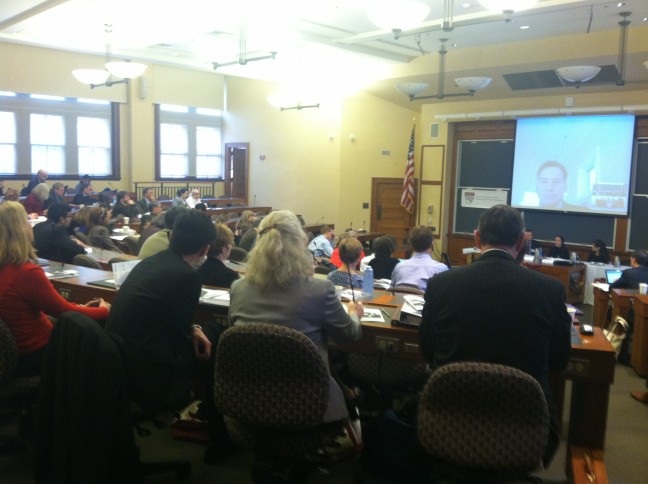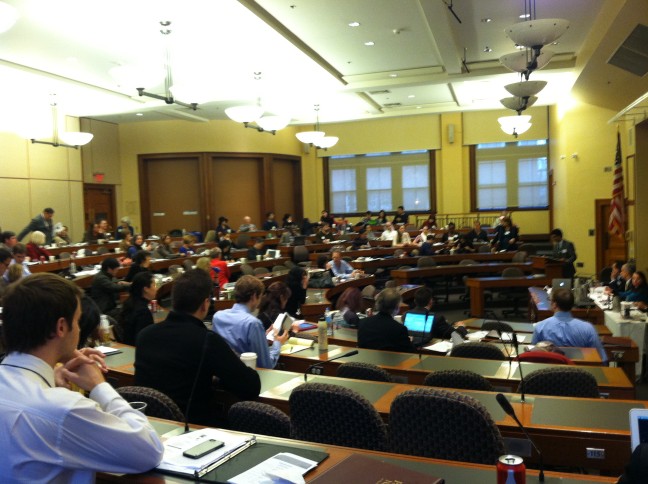Harvard Negotiation Law Review
proudly presented the following Symposium on March 2, 2013:
Ideas and Impact: Roger Fisher’s Legacy
Theme: To honor the work and legacy of Professor Roger Fisher and better understand his impact on negotiation theory, pedagogy, and practice.
Recap & Videos*
>Panel 1: The Little-Known Professor Fisher: Path to a Life in Alternative Dispute Resolution
This panel explored Roger Fisher’s early works and career trajectory. The panelists described Professor Fisher’s work before Getting to Yes, including his early years working with the federal government and as a law professor.
Amy J. Cohen, Associate Professor of Law, The Ohio State University Moritz College of Law
Andrea Schneider, Director, Dispute Resolution Program, Marquette University Law School
Daniel Shapiro, Director, Harvard International Negotiation Program
William Ury, Senior Fellow, Harvard Negotiation Project
Moderated by Michael Wheeler, MBA Class of 1952 Professor of Management Practice, Harvard Business School
Panel 1 Video:
> Panel 2: The Impact of Roger Fisher’s Work at Home
This panel explored the impact of Professor Fisher’s scholarship on domestic affairs and on ADR practitioners in the U.S. The panelists, practitioners in the field of ADR from diverse perspectives, described how they use Professor Fisher’s ideas in their work and the impact of those ideas on domestic ADR practice.
Jared R. Curhan, Sloan Distinguished Professor of Management and Associate Professor of Organizational Studies, Massachusetts Institute of Technology Sloan School of Management
David A. Hoffman, John H. Watson Jr. Lecturer on Law at Harvard Law School and Founding Member, Boston Law Collaborative, LLC
Grande Lum, Director of Community Relations Services, U.S. Department of Justice
Andrew S. Tulumello, Co-Partner-in-Charge, Gibson, Dunn, & Crutcher
Moderated by Michael Moffitt, Philip H. Knight Dean, University of Oregon School of Law
Panel 2 Video:
> Panel 3: The Impact of Roger Fisher’s Work Abroad
This panel explored the impact of Professor Fisher’s scholarship internationally as well as his major contributions to international dispute resolution, including peace agreements. The panelists, practitioners in the field of ADR from diverse perspectives, described how they use Professor Fisher’s ideas in their work and the impact of these ideas on the international ADR practice at large.
Diana Chigas, Professor of Practice of International Negotiation and Dispute Resolution,The Fletcher School at Tufts University
Alain Lempereur, Alan B. Slifka Professor of Coexistence and Conflict and Program Director of the Masters program in Coexistence and Conflict, The Heller School at Brandeis University
Jamil Mahuad, Former President of Ecuador and Executive Education Faculty, Harvard Kennedy School
Bruce Patton, Distinguished Fellow, Harvard Negotiation Project and Founder, Vantage Partners
Moderated by Eileen F. Babbitt, Professor of Practice of International Conflict Management and Director of the International Negotiation and Conflict Resolution Program, The Fletcher School at Tufts University
Panel 3 Video:
> Panel 4: The Future of Dispute Resolution
This panel described changes in dispute resolution and the future trajectory of the field. Panelists addressed pedagogical and methodological shifts that would not be possible without Roger Fisher’s work. The panel also addressed whether it would be possible to have a “Roger Fisher” in the ADR climate of today.
Sheila Heen, Founder, Triad Consulting Group and Lecturer on Law, Harvard Law School
Carrie J. Menkel-Meadow, A.B. Chettle, Jr. Professor of Dispute Resolution and Civil Procedure, Georgetown Law School
Robert H. Mnookin, Samuel Williston Professor of Law, Harvard Law School and Director, Harvard Negotiation Research Project
Robert Ricigliano, Adjunct Professor, Department of Communication, University of Wisconsin-Milwaukee
Moderated by Robert C. Bordone, Thaddeus R. Beal Clinical Professor of Law, Harvard Law School and Director, Harvard Negotiation and Mediation Clinical Program
Panel 4 Video:
*Please note that some videos have been edited to remove copyrighted content. If you’re having trouble viewing the video files, please ensure your browser supports Quicktime.

